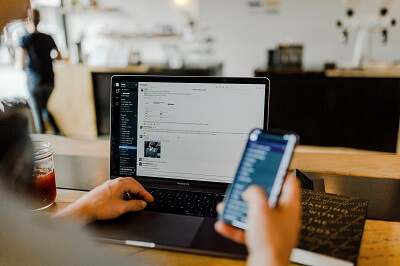There are many times when an email is used as a method of following up on an earlier phone conversation. The question is how to refer to statements from the telephone conversation afterward.

Underline the information you refer to from the phone call as soon as possible in your email. For example: “Hello Mrs. Harper. In our Monday phone call, you said that the product wasn’t operating as intended. I can offer you…”
Should You Always Refer to a Conversation in Your Email?
You don’t always need to refer to conversations in emails but sometimes it can be helpful to do so. Emails should always be as short as possible, especially if they’re being used for business purposes. Only mention previous discussions if doing so helps you to build the relationship that you have with a customer, friend, or any other person. [1]
Typically, you should refer to a conversation if the discussion resulted in your email. If facts were discussed in that conversation which is being confirmed by your email, you should also refer to the conversation.
For example, in a personal email about an event, you might want to confirm the date of the party, the number of people who will be in attendance, and who will be responsible for catering, decorations, and other tasks. If you had a telephone conversation with everyone about their various rules and responsibilities, it would be a good idea to follow up with an email that states all of the facts.
If you agreed with the previous conversation you should also refer to it. Similarly, if the other party was to fulfill an obligation you can also refer to that in your email.
You could write:
“As we agreed to in our earlier discussion, Susan will be responsible for managing the caterers.”
“In our prior phone conversations, Carlos agreed that he would be responsible for booking the hotel.”
“In our group call on the 15th, we agreed on a vegetarian, organic menu for the event.”
How Soon Should You Mention the Conversation?
If your email is a direct follow-up to the conversation, you should mention the discussion as soon as possible. Sometimes the potential customer might genuinely forget what was said. In this case, mentioning the conversation as soon as possible helps them to recall what you discussed.
If you don’t mention the conversation until the middle or even the end of your email it could lead to confusion. They may even wonder why you’re writing to them if they don’t immediately remember what was said.
In the first lines of your email, you could say:
“This email is to confirm the details of your shipment, as we discussed in our phone conversation on Tuesday.”
“As we discussed earlier, the meeting will be held in the conference room. Please make the necessary preparations.”
“As I mentioned in our conversation on Tuesday, the goods will be shipped on Saturday.”
Provide Details of Formal or Business Calls
Business calls are often used to discuss the terms of a contract. An email confirms what was discussed during the conversation. Many people agree orally and in many countries, according to the law that’s binding as long as certain contractual elements are present in the conversation. [2]
It’s always a good idea to put whatever you discussed in writing. Mention all of the facts, so that at a future point no one is unclear about what was discussed.
In these situations, your language should be more detailed than it would be in casual conversations. Refer to specifics, such as dates and locations mentioned during the conversation.
For example, you could say:
“When we spoke about the party, you mentioned that you prefer to have it at the seaside.”
“In our phone conversation on Wednesday, you said that you prefer the blue dress to the red one.”
“We spoke about this on the phone last week Friday. You had said that you wanted to have the new form and I’ve attached it to this email.”
“When we spoke on the phone you requested further dialogue and I’m interested in that.”
Should You Add a Recording of a Business Call?
There are situations where it might be helpful to add a recording of your business conversation to your email. For example, if someone disputes what was said, a recording can be helpful.
In this situation, you would have already received permission from all parties to record the call that’s being referred to in your email. Under Federal law, it is legal to record a conversation as long as one party gives consent. [3]
While Federal law does not require you to gain the consent of all parties before recording, it’s a good business practice to do so. Wiretap law also refers to secretly recording conversations. To remove any doubt and avoid any problems associated with being accused of secretly recording a conversation, take steps to let all parties know that a business conversation is being recorded.
If you have potential clients or business partners who sometimes forget the details of conversations, this technique can be helpful. It’s also helpful if you work in an industry where you need to interface with customers on the phone and conflicts sometimes arise.
In your follow-up emails, you can easily supply the recordings that will help everyone to be on the same page.
You could say:
“It was great talking to you. A recording of our prior conversation is attached to this email.”
“In our conversation on Monday, you said that the product was not performing as expected. A recording of that conversation has been attached to this email for your convenience.”
“We’ve attached a recording of our conversation, where you gave details on the type of ingredients you would like to be used in the recipe.”
If you haven’t asked for permission to record the meeting, you can also add some of your own notes from the last conversation in your follow-up email with the next steps agreed on, action items, and other additional information that may be relevant.
Impromptu References
There are times when you may not have wanted to refer to a conversation. However, it might be necessary to do so when someone questions something that was said.
Your reference would be structured as a response in this case, instead of as an introduction to a topic.
If someone emails you or otherwise requests clarification after your conversation, you could respond with:
“We discussed the instant access to your order system when we talked on the phone, remember?”
“When you called me on Friday, you said that you mentioned wanting goods sent to your warehouse.”
“You had also mentioned the new schedule when we spoke on the phone on Friday.”
Sources:
[1]: https://www.forbes.com/sites/theyec/2021/02/17/why-the-follow-up-is-everything-in-business/
[2]: https://www.lawdepot.com/blog/are-verbal-agreements-legally-binding/
[3]: https://www.dmlp.org/legal-guide/recording-phone-calls-and-conversations

Katie Holmes is a senior author at everyday-courtesy.com with over 15 years of experience in marketing and psychology. As a freelance consultant, she also supports companies and executives in overcoming communication challenges. Katie is a passionate digital nomad working on her first book on the art of communication.

